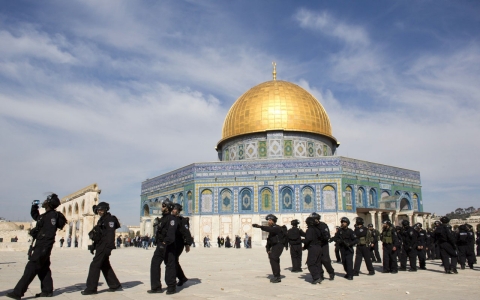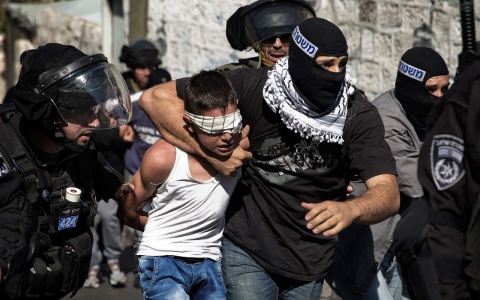When Benjamin Netanyahu led Israel’s opposition rather than its government, he’d typically eviscerate the sitting government over an attack as audacious and as atrocious as the one that took place Tuesday in Jerusalem. As prime minister, he doesn’t have that luxury, particularly since he has based his contemporary appeal to the electorate on the idea that — unlike predecessors who sought to address the conflict with the Palestinians through territorial concessions — he could deliver calm and security for Israelis even while maintaining the occupation and expanding settlements. Israeli civilians being brutally killed while going about their daily business is a shocking disruption of the tranquillity Netanyahu promised, and it obliges him to respond.
In a similar situation this summer, when Israelis’ anger over the kidnapping of three Hebron teenagers and Palestinian outrage over the lynching of a Palestinian teen by three Israeli Jews threatened to overwhelm Israel with a spate of tit-for-tat attacks, Netanyahu channeled the public ire into a sustained military assault on Gaza. Operation Protective Edge, which brought rocket fire to Israel’s largest cities, pressured Israel’s domestic political forces to unite behind its government as if in wartime. Battling a paramilitary organization on its own territory is as close to a conventional war as Israel gets to experience in the last two decades, and controlling the flames of this type of escalation proved more straightforward than trying to contain uncoordinated grass-roots violence on Israeli streets.
Netanyahu also used the Gaza clash as an opportunity to remind Israelis that he had no intention of giving up control of the West Bank — making clear his disdain for the recently aborted White House effort to speedily achieve a two-state solution to the conflict with the Palestinians. This week’s nuclear negotiations between Iran and Western powers present Netanyahu with the opportunity to revive his threats to launch an attack on Tehran’s nuclear facilities — another potential unifying theme for his fractious domestic political landscape. But Western powers appear determined to achieve a compromise with Iran, and Netanyahu’s threats of military action have not been taken particularly seriously by Tehran, given the limits of what the Israeli military could achieve if it acted alone in Iran.
So the latest killings in Jerusalem find Netanyahu with his options narrowing. Barack Obama’s administration has all but washed its hands of the peace process and of pressuring Netanyahu on anything, least of all on the settlements — and the Israeli prime minister is not expecting that to change whether Obama’s successor is a Democrat or Republican. The problem, of course, is that absent any political process to end the occupation, Netanyahu has precious few incentives to offer the increasingly disillusioned Palestinians for cooperation to restore security.
European Union member states, moreover, are mulling economic measures against Israel if no progress toward a negotiated peace takes place, and Israel’s growing diplomatic isolation is unlikely to be reversed by any new military campaign in retaliation for the synagogue slayings.
A new Gaza-style military operation is unlikely to win any significant support in the near future. The Israeli security establishment is not willing to entertain the idea of an all-out takeover of Gaza to eradicate Hamas, and it’s hard to see a significant military option in the West Bank, where Israel depends heavily on the Palestinian Authority security forces as its first line of defense, or East Jerusalem, which is entirely under Israeli control.
Even before the current escalation, Netanyahu was facing growing domestic political challenges, as right-wing coalition partners such as settler leader Naftali Bennett began to use hawkish rhetoric even harsher than the sort Netanyahu once used to challenge the likes of Ariel Sharon, the late Israeli prime minister, to position themselves as alternatives in the next election. Meanwhile, Netanyahu’s acrimonious and unsuccessful attempts to undermine the election of his party’s candidate for president have set the scene for a leadership challenge within Likud.
Before the latest spasm of violence in Jerusalem, Netanyahu put the prospect of early elections on the table, telling Likud leaders on Monday to set a party leadership election for Jan. 6.
All of that may now be put on hold. It is considered a potentially fatal error in Israeli politics to go to the polls amid a security crisis, and such a move would play into the hands of critics — some even within his party — who previously accused Netanyahu of prioritizing his political survival over the interests of the state. Moreover, Israeli political tradition also requires that in wartime, coalition partners and opposition parties rally behind the prime minister in a display of national unity; calling elections would release all parties from this obligation, leaving them free to attack the prime minister at his potentially most vulnerable.
But above all, going to a general election in the midst of renewed political violence would forfeit Netanyahu’s electoral trump card: security. Despite the rapid deterioration of the last few months, Netanyahu can still boast that fewer Israelis died on his watch — and fewer Palestinians, too, if anyone in Israel was counting — than during the tenure of any other Israeli prime minister in the 21st century. Going to elections with blood flowing in the streets of Jerusalem would undermine his message.
In a press conference immediately after the synagogue attack, Netanyahu made a U-turn on early elections, instead inviting opposition parties — those representing Palestinian citizens of Israel exempted — to join a national unity government. While Labor and the more dovish Meretz rejected the invitation out of hand, the parochial but pragmatic ultra-Orthodox parties are considering it. Even if expanding his coalition doesn’t buy Netanyahu much time, it could provide some buffer against pressure from the opponents whose challenge is most threatening: his coalition partners on the right.
Until now, the hawks in his coalition have demanded more of what Netanyahu was already doing, such as expanding settlements and blasting Gaza. But on Jerusalem, they seek a qualitative change, looking to alter the delicate status quo in the city, especially regarding the Temple Mount. Pressure on Netanyahu from right-wing nationalist groups to expand Jewish access to the Temple Mount, home to Al-Aqsa mosque, has begun to lend an increasingly religious character to what was hitherto a primarily national conflict — just as religious violence is spiking across the Middle East.
Netanyahu has built his career on opposing the creation of a Palestinian state, standing up to U.S. pressure for territorial compromise and sounding the alarm about Iran’s nuclear work. While he may be more pragmatic than some of his coalition partners, his coupling of low-key settlement expansion with fiery rhetoric has pushed Israel’s mainstream political median steadily to the right. Those right-wing coalition allies may have made Netanyahu look like a responsible stalwart of the center-right, but their momentum could carry the prime minister along.
Having been unceremoniously sidelined by the international community over Iran, Netanyahu now confronts a domestic security crisis for which he very deliberately offers no political solution. He has taken ending the occupation and Palestinian statehood off the agenda, but having seen off U.S. efforts to complete the peace process, he offers no alternative beyond the status quo.
The factions and parties to Netanyahu’s right are demanding he makes good on his rhetoric, but the pragmatist in him will be aware that further escalation could see the situation spin further out of control — particularly if the recent pattern of right-wing citizens’ groups taking matters into their own hands is repeated in revenge attacks for the Jerusalem murders. His political instincts and the security challenges he manages as prime minister may be pulling him in opposite directions. And long gone is the uncontested political authority that had Time magazine crown him “King Bibi” just two years ago. Fewer and fewer Israeli politicians are still bend the knee to Netanyahu, even as he confronts the most challenging crisis of state of his entire tenure.

Israel’s closure of Al-Aqsa mosque this week raised fears of escalating confrontation in the holy city

Israel claims the holy city as its ‘eternal, undivided capital,’ but that claim is not internationally recognized

Analysis: Competing claims and ongoing settlement fuel tensions that have escalated security crackdowns






Error
Sorry, your comment was not saved due to a technical problem. Please try again later or using a different browser.